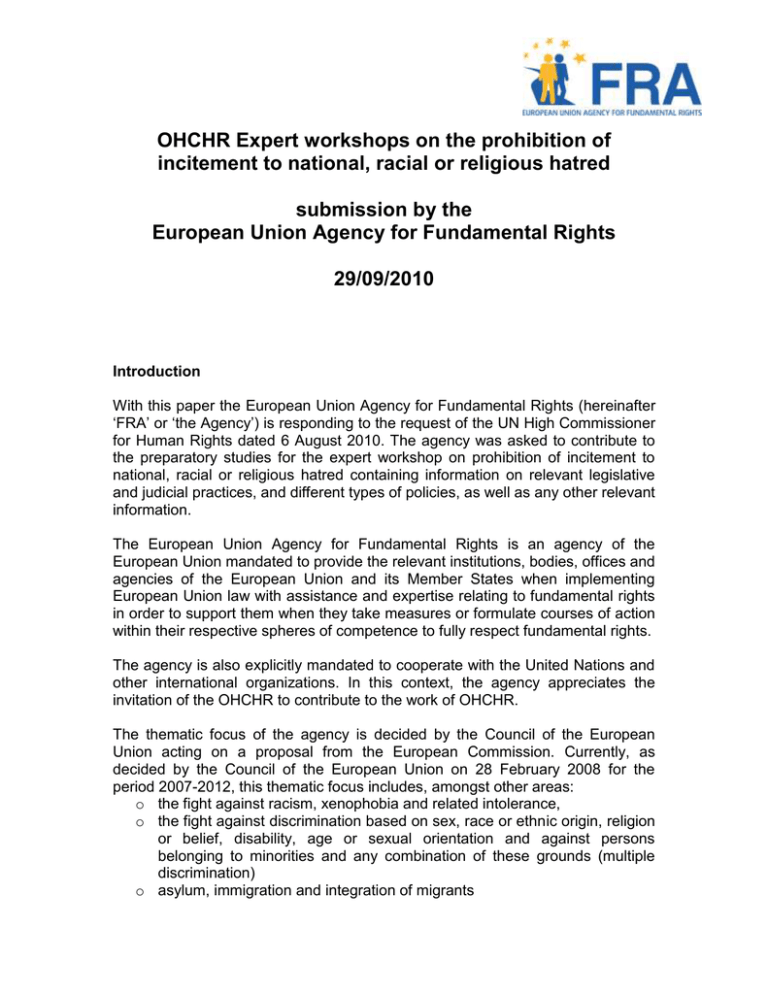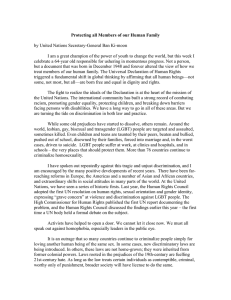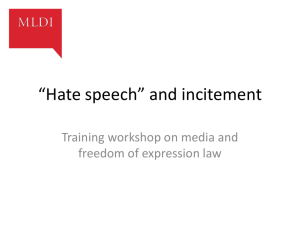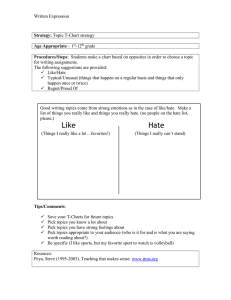OHCHR Expert workshops on the prohibition of submission by the
advertisement

OHCHR Expert workshops on the prohibition of incitement to national, racial or religious hatred submission by the European Union Agency for Fundamental Rights 29/09/2010 Introduction With this paper the European Union Agency for Fundamental Rights (hereinafter ‘FRA’ or ‘the Agency’) is responding to the request of the UN High Commissioner for Human Rights dated 6 August 2010. The agency was asked to contribute to the preparatory studies for the expert workshop on prohibition of incitement to national, racial or religious hatred containing information on relevant legislative and judicial practices, and different types of policies, as well as any other relevant information. The European Union Agency for Fundamental Rights is an agency of the European Union mandated to provide the relevant institutions, bodies, offices and agencies of the European Union and its Member States when implementing European Union law with assistance and expertise relating to fundamental rights in order to support them when they take measures or formulate courses of action within their respective spheres of competence to fully respect fundamental rights. The agency is also explicitly mandated to cooperate with the United Nations and other international organizations. In this context, the agency appreciates the invitation of the OHCHR to contribute to the work of OHCHR. The thematic focus of the agency is decided by the Council of the European Union acting on a proposal from the European Commission. Currently, as decided by the Council of the European Union on 28 February 2008 for the period 2007-2012, this thematic focus includes, amongst other areas: o the fight against racism, xenophobia and related intolerance, o the fight against discrimination based on sex, race or ethnic origin, religion or belief, disability, age or sexual orientation and against persons belonging to minorities and any combination of these grounds (multiple discrimination) o asylum, immigration and integration of migrants The agency is therefore well placed to contribute to the preparatory studies for the expert workshop on prohibition of incitement to national, racial or religious hatred. The agency has especially undertaken the following reports and projects which might be of interest for the preparatory studies of OHCHR: 1. EU-MIDIS - the ’European Union Minorities and Discrimination Survey’ In 2008 the FRA carried out a large-scale survey on immigrants and ethnic minorities’ experiences of discrimination and victimisation in the 27 EU Member States: the ’European Union Minorities and Discrimination Survey’ (EU-MIDIS). In total, 23,500 immigrant and ethnic minority people were interviewed using a standardised survey questionnaire in face-to-face interviews regarding their experiences. Respondents from one to three groups, based on respondents’ selfidentification, were selected for interviewing in each Member State – these groups included the Sub-Saharan Africans, Central and East Europeans, North Africans, Roma, Russians, Turkish and Former Yugoslavians. A further 5,000 people from the majority population living in the same areas as minorities were interviewed in ten Member States to allow for comparisons of results concerning some key questions. The results of EU-MIDIS were published in 2009 and are available at http://fra.europa.eu/eu-midis; including the Main Results Report, a Technical Report, and a series of Data in Focus reports1. Copies of all these reports are also annexed to this contribution. The questionnaire section on victimisation asked respondents about their experiences of five crime types – vehicle theft, burglary, theft of personal property, assault or threat, and serious harassment. Victims of each of the five crimes were asked whether they felt that the incident was motivated by their immigrant or ethnic minority background. One in four respondents in EU-MIDIS (24%) had been victims of crime in the past 12 months, and half of those who had been victimised (48%) felt that they had been victims due to their immigrant or ethnic minority background. Among the groups surveyed, three in five Roma (63%) and Sub-Saharan African (60%) victims of crime perceived that their victimisation was motivated by their immigrant or ethnic minority background. 1 Each of the Data in Focus reports concentrate on specific survey findings in relation to particular groups and issues. The FRA will continue to publish the results of the survey in the Data in Focus series – the reports published so far highlight the experiences of the Roma, the Muslims, and results on rights awareness and Equality Bodies in the EU. The survey asked the victims of assaults, threats and serious harassment a set of detailed questions about the latest incident of violence. Overall, for every 100 people interviewed in the survey, the respondents had experienced 15 assaults or threats and 35 incidents of serious harassment in the past 12 months on average, while for Roma and Sub-Saharan Africans there were over 60 incidents for every 100 respondents (69 and 61 incidents respectively). 64% of the victims of assault or threat, and 83% of victims of serious harassment in the past 12 months did not report the incident to the police. In the case of both crimes, respondents said that they did not go to the police because they believed that nothing would happen, that it was not worth reporting, and that they would deal with the problem themselves. However, one in five of those who did not report assault, threat or serious harassment said that reporting to the police would have had outright negative consequences for them, and one in seven feared the intimidation of the perpetrators if they were to learn that the incident had been brought to the attention of the police. Out of those respondents who had reported the incident to the police, one in three of the victims of assault or threat (29%) and serious harassment (32%) where satistified with how the police dealt with the matter, whereas two in three victims were either dissatisfied or neutral concerning the way police handled the matter. In addition to the experiences of victimisation, one in five respondents (19%) said that they avoid certain places or locations for fear of being assaulted, threatened or harrassed because of their immigrant or minority background. 2. FRA project on racist hate speech and hate crime The recent research undertaken by RAXEN (“Racism and Xenophobia Network”), a research network of the agency, is intended to provide the FRA with a comprehensive overview of the status of policy and practical developments across the EU, including legislative developments with respect to recognition of and responses to racist and related hate crimes and hate speech. This project is currently ongoing and results are expected for 2011. As an illustration, the following research outputs are expected: o An overview of existing and publicly available data on racist violence and related hate crimes and hate speech for each Member State – indicating trends, and showing existing gaps in data collection; o A detailed overview of who (which agencies) collect and publish data on racist and related hate crimes and hate speech in each Member State, and how this is done in practice – focusing on official data collection mechanisms and current barriers to reporting faced by the public; o An overview of relevant legislation and case law in each Member State in the fields of racist and related hate crimes and hate speech, and in the light of the adoption of the Council Framework Decision on combating certain forms and expressions of racism and xenophobia by means of the criminal law (Council Framework Decision 2008/913/JHA of 28 November 2008); o An overview of good and promising practices in data collection in the field of racist and related hate crimes and hate speech, with an indication of how legislation ‘in the books’ currently relates to data collection in practice. Once the corresponding report and findings are available, FRA could forward the report and relevant findings to OHCHR to assist its preparation of the workshops. 3. Homophobia Article 20 of the ICCPR is limited to advocacy of national, racial or religious hatred that constitutes incitement to discrimination, hostility or violence. But the Charter of Fundamental Rights of the European Union is the first international human rights document, which explicitly prohibits discrimination on the ground of sexual orientation. Furthermore, the European Union has the competence to legislate to combat discrimination based on sexual orientation, amongst other discrimination grounds. In this context, also homophobic hate speech and hate crime is a topic which the agency has covered. Even though it is not covered by the ICCPR, the fight against homophobic hate speech and hate crime might be of interest to the OHCHR as a good practice. In June 2007 the European Parliament asked the FRA to develop a comparative report on homophobia and sexual orientation discrimination in the EU Member States to assist the European Parliament's LIBE committee (committee on civil liberties, justice and home affairs) in its deliberations concerning the need for a Directive covering all grounds of discrimination. In response, the FRA launched this project composed of two parts. The first part, published in June 2008, contains a comparative legal analysis related to homophobia in the EU Member States. Part 1 of the report, the legal analysis, also highlights that homophobic hate speech and hate crime represent obstacles to the possibility for individuals to exercise their free movement and other rights in a non-discriminatory manner. According to the evidence provided in Part 2 of the report, the social situation, LGBT persons experience discrimination, bullying and harassment throughout the EU. This often takes the form of demeaning statements, name calling and insults or the use of abusive language, but also verbal and physical attacks, including even deadly assaults. Both published homophobia reports are annexed to this contribution. Currently, an update of the 2008 legal analysis is underway. It is expected to be published in 2010. This update finds that 13 Member States (Belgium, Denmark, Estonia, France, Ireland, Lithuania, the Netherlands, Portugal, Romania, Slovenia, Spain, Sweden, and the UK) explicitly criminalise incitement to hatred or discrimination on grounds of sexual orientation. Since 2008, only Slovenia has joined this group. However, in several Member States only negative expressions amounting to ‘incitement to hatred’ are captured by existing criminal law provisions. Furthermore, case law collected by the FRA shows that in some Member States the courts might have a tendency to apply the law narrowly, especially when negative or biased statements are based on religious views. In other Member States, however, such a defence is less readily accepted. Criminal law provisions on ‘incitement to hatred’ and ‘aggravating circumstances’ covering explicitly sexual orientation Codes: = Applicable; positive development since 2008 Country Codes Criminal offence to incite to hatred, violence or discrimination on grounds of sexual orientation Aggravating circumstance Existing provisions of the criminal law against incitement to hatred explicitly restrict the protection to groups other than LGBT people AT BE Comments BG Existing provisions of the criminal law against incitement to hatred explicitly restrict the protection to groups other than LGBT people CY General provisions could extend to LGBT people New Criminal Code in 2009 contains no explicit recognition of homophobic hate crimes. LGBT could fall under the category ‘group of people’, but as the law entered into force in January 2010 there no case law yet. The explanatory report of the law also does not define the term. Hate speech legislation does not explicitly extend to homophobic motive, but extensive interpretation has been confirmed by Courts. CZ DE DK EE EL ES FI FR HU IE LGBT people could fall under the category “comparable group”. A working group has proposed that the provision on incitement be amended to explicitly cover sexual minorities (2010) LGBT people could fall under the category ‘groups of society’. Penal Code was amended to include hate motivated crimes against 'certain groups of society'. Case law has shown this includes the LGBT community. Homophobic motivation might be taken into consideration at the sentencing stage, but this is left to the discretion of the courts Criminal law provisions on ‘incitement to hatred’ and ‘aggravating circumstances’ covering explicitly sexual orientation Codes: = Applicable; positive development since 2008 Country Codes Criminal offence to incite to hatred, violence or discrimination on grounds of sexual orientation Aggravating circumstance IT LT LU MT PL PT existing provisions of the criminal law against incitement to hatred explicitly restrict the protection to groups other than LGBT people Homophobic motivation was included in the list of aggravating circumstances in June 2009 General provisions could extend to LGBT people LV NL Comments Homophobic motivation might be taken into consideration at the sentencing stage, but this is left to the discretion of the courts existing provisions of the criminal law against incitement to hatred explicitly restrict the protection to groups other than LGBT people The 2009 Public Prosecution Service’s Bos/Polaris Guidelines for Sentencing recommend a 50% higher sentence for crimes committed with discriminatory aspects. General provisions could extend to LGBT people RO SE SI Art. 317 of the Criminal Code sanctions only hate speech as ‘incitement to discrimination’, but includes sexual orientation. Art. 369 on incitement to hatred does not mention sexual orientation explicitly, but covers incitement against a ‘category of persons’, without further specification. The new Criminal Code will enter into force on 1.10.2011. Article 297 of the new Penal Code concerning provoking or stirring up hatred, strife or violence, or provoking other inequality explicitly includes sexual orientation LGBT people could fall under the category ‘group of people’ SK UK (N-Ireland) UK (Eng. & Ws.) UK (Scotland) The Criminal Justice and Immigration Act 2008, extending provisions on incitement to racial or religious hatred to cover the ground of sexual orientation, come into force on 23.03.2010. It applies to Scotland as well. In June 2009, the Offences (Aggravation by Prejudice) (Scotland) Act was passed, entry into force on 24.03.2010, also indicating homo- and transphobic motive as an aggravating circumstance.




